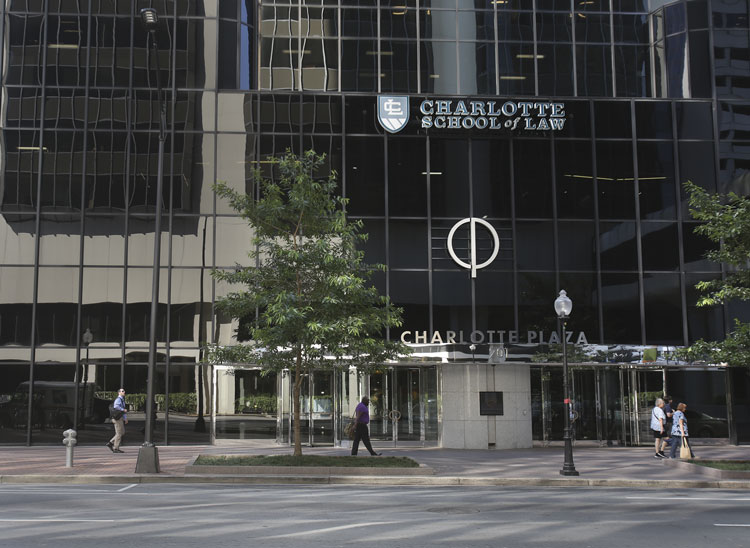How can the ABA improve law school compliance after CSL closure?

Photo of the Charlotte School of Law by Albert Dickson
On top of the rebukes from the ABA and the DOE, Charlotte lost its state license in August. It’s still under investigation for civil fraud, says North Carolina Attorney General Josh Stein, who’d also like to see more transparency in the accreditation process.
“Information is key when students are shopping for a school, and one of the data points students look for is accreditation,” Stein says. “While I understand the desire to not hurt a school’s reputation while an accreditor’s investigation is ongoing, you have to weigh that with a student’s right to know potential problems with the educational program they are investing potentially hundreds of thousands of dollars in buying.”
CHASING COMPLIANCE
Law school officials see things differently. They would have liked more time to come into compliance with the standards before federal student loan money was originally pulled in December, says Paul Meggett, who was Charlotte’s dean when it closed.
The law school was required to have an ABA-approved teach-out plan to keep its state license. The legal education section’s council, which has final authority on teach-out plans, had a scheduled meeting on Aug. 11, one day after the state licensing deadline.
“And the council did not have—and would not create—a mechanism to decide on CSL’s plan prior to the council’s scheduled meeting to assist the school under these exigent circumstances,” Meggett says.
Charlotte has until Feb. 3 to come into compliance with the ABA standards. Meggett says the law school has no plans to reopen.
“What is most unfortunate is that even though the ABA, the state accreditor and the Department of Education all are charged with protecting students, it is the students who were harmed the most by their actions,” he says.
UNDER SCRUTINY
When the ABA announced that Charlotte was on probation, it also announced a public censure for the Valparaiso University Law School. Like Charlotte, Valparaiso was found to be out of compliance with ABA standards 501(a) and (b), which focus on admissions. Candidates’ LSAT scores play a significant role in the decision process.
Valparaiso submitted its reliable plan to the ABA in December 2016, and it was approved in the spring, says Andrea Lyon, the law school’s dean. She came to the school in 2014, replacing Jay Conison. After Conison left Valparaiso, he was appointed as dean at Charlotte, a position he held until this past spring.
Part of Valparaiso’s reliable plan was to improve its median LSAT score, and this fall it averaged out to 151, Lyon says. Comparatively, the law school’s 2016 median LSAT score was 147. Also, between 2015 and 2017, the school’s 1L class decreased from 139 students to 28 students.
Recruiting students, particularly ones who have high LSAT scores that could help with standards compliance, is challenging when a law school has a public censure, Lyon says. Her career has centered on defending murder cases and teaching criminal defense skills in clinical law classes. She credits the skills she developed representing people charged with horrendous crimes for helping her lead a law school through challenging times.
“You just have to press forward; that’s all you can do. I file a motion, and it gets denied—I don’t just go home; I still have to try the case, and I have to respect the court,” she says. “That’s part of what I think you have to do when dealing with the accreditation committee.”
Sidebar
Charlotte School of Law: A Turbulent Timeline
This article appeared in the November 2017 issue of the ABA Journal with the headline “Post-Mortem Exam: In the wake of Charlotte School of Law’s closure, how can the ABA improve law school compliance?"


